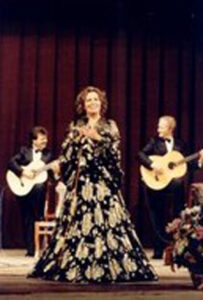
International star Amália Rodrigues spent a few days in Goa to meet her fans and lovers of the Portuguese fado. She performed at Kala Academy’s Dinanath Mangueshkar auditorium to a 1000-plus audience on the evening of June 5.
Despite her 70 years of age, Amália, as she is affectionately called, regaled one and all. Her language is universal, so the youngsters understood her too. But for the older folks which comprised 75 per cent of the audience the performance was tinged with nostalgia. The sentimental Portuguese sang their fado (fatum, fate) far from their country, on the banks of the Mandovi.
Born of humble parentage in Lisbon, in 1920, Amália, who sang fados and tangos at the tender age of three, made her debut at 20.
At the Campal auditorium she regaled the audience with twenty-eight fados, old and new: ‘Rosa Fogo’, ‘Amêndoa’, ‘Entrega’, ‘Povo’, her own ‘Grito’, ‘Lágrima’. And lágrimas de alegria (tears of joy) flowed down her cheeks when she noticed the excitement of her fans as she sang the older numbers like ‘Que Deus me perdoe’, ‘Nem às paredes confesso’, ‘Madragoa’, ‘Barco Negro’, ‘Mariquinhas’, ‘Lisboa Antiga’, ‘Alfama’, ‘Lisboa, não sejas francesa’, ‘Coimbra’, ‘Ai Mouraria’, ‘Foi Deus’, to end with ‘Casa Portuguesa’.
And a Casa Portuguesa (Portuguese house) it was indeed. Remarked an All India Radio staffer, ‘This is probably the audience we have for our weekly Renascença…’
Amália sang and conquered. She had four brilliant accompanists: Pinto Varela and Carlos Gonçalves (Portuguese guitar); himself a composer, Joel Pina (viola baixo), and Lelo Rodrigues (viola). The sustained brilliance of the foursome dramatically underlined the romantic and expressive nuances of the fado which came effortlessly to the Queen of the Fado. The enraptured audience only wished Amália had come here in her younger days.
A charismatic personality, Amália is said to have ‘rescued’ the fado, transforming it into a universal art. Today her strongest point lies in the fact that she can still draw a big audience the world over, but oddly enough not in Portugal itself. Still she is easily Portugal’s best cultural ambassador to the world.
The show in Goa was sponsored by Fundação Oriente. Amália’s stopover in Goa, on her way to Macau, South Korea, Japan, USA and Monte Carlo, was definitely a landmark in the cultural calendar of this tiny state, but sad to say, the occasion was mismanaged by local co-sponsors INTACH.
Things began going wrong, right from the word go. Invitations and passes were distributed at the fancies of INTACH members, much before the general public even became aware of the show. A member of the audience commented that the passes finally went not to Amália fans but only to a coterie. The result: an indignant public responded by gate-crashing. And, certainly, enthusiasm overflowed from the back rows of the auditorium which comprised, among others, several gate-crashers!
What was also unbecoming was the near-anarchic scene at the gate and inside the auditorium where there were no ushers. The compere too was a poor choice: with scant knowledge of Portuguese, he faltered at every step, and even mispronounced the key word, fado, to rhyme with mando!
Finally, unpardonable was also the fact that while Amália was showered with gifts, garlands and bouquets, from the Government of Goa, Panjim Municipal Council and INTACH, her four smart accompanists were left high and dry! Minus points for the fabled ‘Goan hospitality’…
An international star deserved better coverage in the press, not for her sake but for the benefit of the public at large. But Amália was hardly in the limelight. And it was hardly her fault. Her fado was to have the local entourage impose themselves on the Queen to the point of disallowing her contact with pressmen, barring a few instances of journalists who had to fight their way in.
But to Amália these things mattered little. It was also in her fado to lose her baggage in transit. But that did not deter her. She wore that beautiful smile and lent everyone her magic voice…that’s because the fado turns magical with Amália.
This even makes us redefine the fado. The Portuguese language dictionary calls it destino, fatalidade, canção popular e dolente (‘destiny, fatality, a song popular and sorrowful’). But the face of the fado has changed over the years. This compels us to redefine the fado as Amália!
(Goa Today, July 1990)